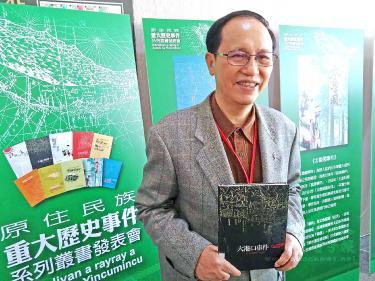
The Council of Indigenous Peoples (CIP) said that it is collaborating with the Ministry of Education to incorporate the 10 most important events in Aboriginal history into the 12-year National Education Program to give the younger generation an insight into these events from the perspective of Aborigines.
The council made the comments at a news conference on Wednesday to launch a 10-book series focused on historic events viewed through the eyes of Aborigines.
Experts and academics started work on the series in 2002, council Minister Icyang Parod said in a speech.
Members of the Presidential Office’s Indigenous Historical Justice and Transitional Justice Committee and the council also collaborated on the series, Executive Yuan Minister Without Portfolio Lin Wan-i told the news conference.
Since her first inauguration in 2016, President Tsai Ing-wen has pushed to “reconstruct” history from an Aboriginal perspective, revitalize Aboriginal culture, grant increased autonomy to Aboriginal communities and ameliorate the living quality of Aborigines, Lin said.
The population, system, settlements and cartography featured in the books are based on Aboriginal knowledge at the time, Lin said, adding that the series aims to remove stereotypes about the role of Aborigines in history.
“We hope that such knowledge would allow Taiwan’s multiethnic society to come to respect each other,” Lin said.
The series would allow Taiwanese to see history from the perspective of Aborigines and understand how it affected them, Presidential Office Deputy Secretary-General Lee Chun-yi said.
Many people were asked to share their experiences over the years, Lee said, adding that he hoped this is only the beginning of such efforts.
Through this project, the government hopes to share with non-Aborigines a part of history that the nation’s Han Chinese are not privy to, Lee said.
Commenting on the Dagangkou incident, Society of Indigenous Professors in Taiwan chairman Safulo Raranges said that Amis Aborigines had fought and stopped three waves of Qing Empire invaders before being massacred.
“After that incident, Aborigines were not allowed to speak their mother tongues, nor hold their unique annual ceremonies,” Safulo said.
The incident was a part of then-Qing imperial representative Shen Baozhen’s policy to expand into the mountains and to “pacify” Aborigines.